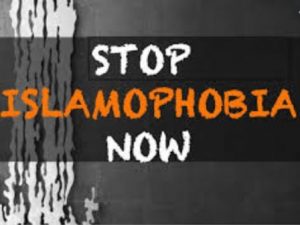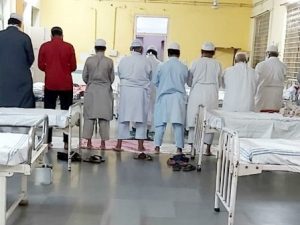Communalisation of the Pandemic: A “Malice” that Deprived the Marginalised
In a country where access to entitlements is marred with caste-based discrimination and corruption, any other stigmatisation adds to the social woes.
The trickling down of the “malice” from institutions to the society has led to deprivation of the most marginalised communities in India. In context to the political controversy around the role of  Tablighi Jamaat in spreading COVID-19 in India, the Bombay High Court on 23 August took cognisance of the pernicious role of the media in furthering state’s propaganda against the Muslim minorities. The Court noted, “A political Government tried to find the scapegoat when there is pandemic or calamity and the circumstances show that there is probability that these foreigners were ‘chosen’ to make them scapegoats”, only because they were Muslims. Conspicuously, the foreigners belonging to other religious communities did not face a similar wrath of the central government.
Tablighi Jamaat in spreading COVID-19 in India, the Bombay High Court on 23 August took cognisance of the pernicious role of the media in furthering state’s propaganda against the Muslim minorities. The Court noted, “A political Government tried to find the scapegoat when there is pandemic or calamity and the circumstances show that there is probability that these foreigners were ‘chosen’ to make them scapegoats”, only because they were Muslims. Conspicuously, the foreigners belonging to other religious communities did not face a similar wrath of the central government.
In trying to understand the “Background to the Malice”, the Court rightly linked the government’s action to the Citizenship Amendment Act (CAA) 2019 and the protests across the country that took place prior to January 2020. Establishing a connection between anti-CAA protests and the targeting of the Tablighi Jamaat by the government, the Court sees it as an attempt to create fear in minds of Indian Muslims. This deliberate targeting of the Tablighi Jamaat is a warning to Indian Muslims that action in any form can be taken against Muslims. Thus, the Court observed, “There is smell of malice in the action taken against these foreigners and Muslim for their alleged activities.”
The systematic targeting happened with the dissemination of fake news by some TV channels, which popularised the use of terms like ‘Corona Jihad’, ‘Corona Terrorism’, ‘Corona Bombs’ and ‘Islamic Insurrection’ to harass, stigmatise and de-humanise the Muslim community. The actions of the government, filing of FIRs and calls for boycott achieved what was intended: The communalisation of the pandemic and acquiring social sanction to its agenda of othering, stigmatising and marginalising of the Muslim community.
A question that comes to one’s mind is how did this discourse set by the media and the state impact the lived realities of the most marginalised within the community? A recently conducted survey demonstrates that Muslims suffered the most from prejudice during the pandemic, impacting them adversely on issues of livelihood, access to food, education, healthcare and other social indicators.
Data for the Muslim community were collected for the period between April and June 2020 for 53 locations, covering four states across India—Bihar (32), Gujarat (18), Jharkhand (1) and Uttar Pradesh (2)—by representatives of community-led organisations termed ‘COLLECT’ (an abbreviation for Community-Led Local Entitlements & Claims Tracker). This initiative consisted of a flow of information between those at the margins, the authorities and wider society. The data can be accessed on www.communitycollect.info.
It was found that one of the services to be adversely affected by this stigmatisation was healthcare.
Also Read : Delhi and COVID-19: A Glimmer of Hope
While 72 per cent hamlets responded having a government health facility at the location, 28 per cent had no such facility at the location. Of these, 67 per cent of the locations reported that they could not access treatment and medicines available close-by. In areas where the healthcare services were available, the community preferred taking medicines from medical shops than going to government facilities because of deep sense of fear and loss of trust on the government. According to Rukhsana Vora, Sahyog Charitable Trust, Vatva, Gujarat, “The Tablighi Jamaat incident was used to stigmatise the Muslim community as being carriers of corona virus, both by politicians and the media. It had a bad impact on the community, since many lost trust in the government and were apprehensive approaching government health institutions for the fear that they would never come back. This sense of fear was aggravated by the reported cases of discrimination against Muslim community in hospitals in Ahmedabad, Gujarat.”
The stigmatisation took a devastating toll over the livelihood of the community. A BJP MLA from Charpauli, Uttar Pradesh, had called for the segregation of the people from “those from their (Tablighi Jamaat) community”. According to Shahroz Fatima, Pragati Madhyam Samiti, Uttar Pradesh, “there were locations with ‘No Muslim Vendors Allowed’ boards in Mathura, Jhansi, Bareilly, Aligarh and Chitrakoot”.
Given that most of the Muslims are self-employed with the lack of stable livelihood options, less accessibility to bank loans, many have been forced to take informal loans and are subjected to high levels of indebtedness. The availability of bank credit to Muslim entrepreneurs, according to the survey, was also low with 62 per cent locations reporting that no one applied and 28 per cent were declined bank loans. It was reported that across 64 per cent of the locations, indebtedness or informal loans has increased.
These loans were often taken from employers, money lenders, neighbours and relatives and indebtedness has always been a trigger for other social and economic exploitation causing a rise in trafficking, bonded labour and child labour.
Corroborating the finding, Ruksana said, “During the COVID-19 times, it was said that most of the Muslims might be infected with this virus and they need to get tested. Muslim vegetable vendors were also boycotted. Many of them started depending on informal loans”.
 Moreover, the data for access to food show that 66 to 71 per cent of the Muslim habitations did not receive any rations in lieu of the mid-day meals between April and June, and 56 per cent locations did not receive any supplementary nutrition from the Anganwadi for pregnant and lactating mothers as well as young children. More than 60 per cent of habitations did not receive ration under extension to non- ration card holders across three months.
Moreover, the data for access to food show that 66 to 71 per cent of the Muslim habitations did not receive any rations in lieu of the mid-day meals between April and June, and 56 per cent locations did not receive any supplementary nutrition from the Anganwadi for pregnant and lactating mothers as well as young children. More than 60 per cent of habitations did not receive ration under extension to non- ration card holders across three months.
The propaganda that was laced with prejudice had debilitating impact on the most vulnerable within the community that is often wrongly perceived as a homogenised group. Among the 53-Muslim locations for which data were collected, 10 locations were the poorest performing on the basis of their access to the various relief entitlements. Of these, six were from Bihar. The worst performance in these 10 locations has been in the access to entitlements, where not a single hamlet has stated that all families have received them. Taking note of this systemic deprivation, Advocate Kalam, a De-Notified Tribe activist from Bihar, said the communities surveyed were Muslims belonging to the Semi-Nomadic Tribes and those into inter-generational sex work, who do not have identity documents and already face discrimination for their occupation. “Some of them have also been targets of lynching,” said Kalam.
The media propagated hashtags #CoronaJihad, many who even worked as labour were not given entry in villages to work.
Also Read : Nusrat Jahan: Promising MP or Just Another Glamour Queen? Specialist
In a country where access to entitlements is marred with caste-based discrimination and corruption, any other stigmatisation adds to the social woes. The communalisation of pandemic was particularly difficult for the marginalised who either faced boycotts or feared approaching the state institutions for basic services. That the state can push its most vulnerable minorities under the bus, during the pandemic, has led to loss of trust in the government and only confirms the state’s “malice” towards its Muslim citizens.
That the Tablighis were made the scapegoat compared to other religious groups is reminiscent of the deeply entrenched discrimination in the institutions. There were few voices which came forward and wrote to the President of India that the issue should not be communalised since it has the potential to be a pretext for targeting Muslims. The fears are not unfounded. It is only natural that a society that has been discriminatory towards doctors and nurses, the frontline warriors during COVID-19 pandemic, will find such stigmatisation and calls for boycott of the Muslim community legitimate.
